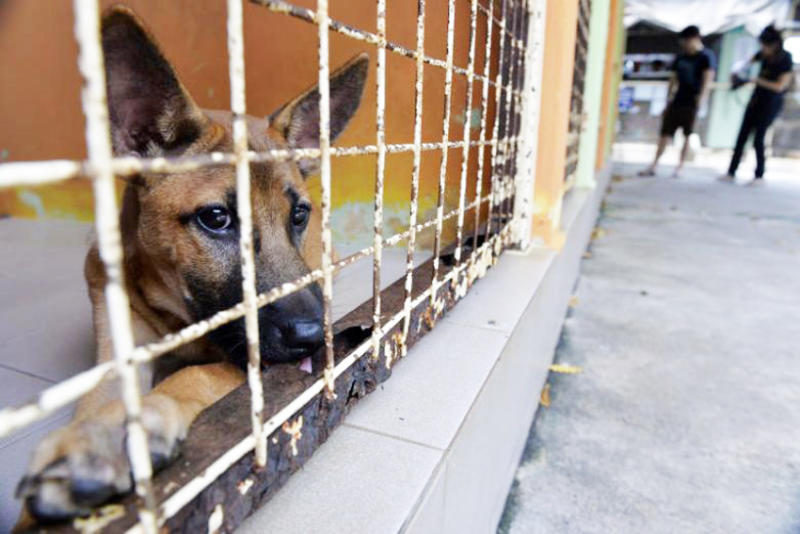More pet owners, community feeders struggle with upkeep of animals amid Covid-19 pandemic
Sign up now: Get ST's newsletters delivered to your inbox

Due to overwhelming demand, SPCA has expanded its pet food support programme fund from the initial $50,000 to $230,000.
PHOTO: ST FILE
Follow topic:
SINGAPORE - Hard hit by the pandemic, more community feeders and pet owners have been asking animal welfare organisations for help.
Due to overwhelming demand, the Society for the Prevention of Cruelty to Animals (SPCA) has expanded its pet food support programme fund from the initial $50,000 to $230,000.
The programme, which began last August, is now on track to provide three to six months' worth of food for the 1,832 animals now registered under 629 applicants.
It plans to provide for common domestic animals in Singapore such as dogs, cats, hamsters, rabbits and fish.
Of the $230,000, $150,000 comes from SPCA's funds. The remaining $80,000 came from a recent public fund-raiser.
The SPCA has also recently applied for a dollar-for-dollar matching grant from the Tote Board to boost the fund, which was set up to help pet owners affected by the Covid-19 pandemic.
SPCA's executive director, Dr Jaipal Singh Gill, 38, told The Straits Times that it received an unusual number of calls for help from pet owners about pet food around the middle of last year.
Within 24 hours of the launch of the fund, the SPCA received several hundred applications.
Pet owners can apply for support for up to three pets at home, and five pets if they are feeding animals in the community.
Dr Gill, a veterinarian, said the applications "came from people who are out of work because of the pandemic or freelancers not getting work, but who don't want to have to give up their pets".
Applicants like former interior designer Mariani Basri, 44, who lost her job amid the pandemic, was worried about coping with the food expenses of her four cats as well as making ends meet as a single mother of three children.
"Thankfully, with the help of SPCA, I no longer have to worry about this issue and it's really helping me with my costs and funds."
Ms Mariani, who refers to her cats as her "babies", has had them for five years, since they were kittens. Financial difficulties forced her to consider putting them up for adoption. "Even when I don't have cash, finding food for them is still a priority," she said.
Dr Gill said the process of going through applications was both heartbreaking and heart-warming, as despite their personal suffering, many pet owners and feeders were still trying their best to provide for their animals.
"It wasn't any one case that stuck with me but the general theme of people losing their jobs and not having sufficient funds to look after themselves and their families, but still looking after animals and not wanting them to go hungry," he said.
The food will be distributed in three rounds, in partnership with online pet shop Kohepets. The first round - where SPCA distributed more than 15,000kg of dog and cat food - was recently completed. The second round of distribution is ongoing.
The Animal & Veterinary Service (AVS), which is under the National Parks Board, has also increased support for needy pet owners.
During this pandemic, it has provided a pack of food with every dog, cat and rabbit rehomed from AVS by animal welfare groups.
Many community feeders have also appealed to Causes for Animals Singapore (CAS) for help, prompting the organisation to hand out more food to these feeders, who mostly work as cashiers or in retail.
Each feeder is given around 50kg of food a month.
CAS fund-raising coordinator, Christine Bernadette, 32, said: "Before the pandemic, we supported around 15 feeders. Now we support between 30 and 40 feeders."
More abandoned cats
Ms Bernadette said that more cats were also being abandoned, based on an increase in sterilisation requests for strays during the pandemic. The number of such appeals each month has increased from 15 to 25.
She said: "We can tell that most of these cats have been dumped, because they have not been sterilised by us and they are terrified of strangers, unlike the community cats."
She said these felines are usually abandoned when families are overwhelmed and cannot manage too many cats as they multiply.
It costs about $120 to sterilise, chip and vaccinate a cat.
Without sterilisation, two months is all it takes for a cat to have a litter of between four and six kittens, she said.
Ms Thenuga Vijakumar, 35, president of the Cat Welfare Society (CWS), said it opened its pet cat sterilisation scheme for financially distressed households on Nov 1 last year. These costs are borne entirely by CWS with no government financial assistance.
And as at Dec 31 last year, CWS has sterilised 543 cats from over 100 needy families, with one case involving around 40 cats.
Ms Thenuga said that CWS would have liked to have introduced the programme earlier, but the society had to be certain there were sufficient funds for it.
The sterilisation programme will run until July, but Ms Thenuga hopes to extend it by raising more funds in the coming months. CWS has budgeted for the sterilisation of 100 pet cats a month this year.
On tackling cat abandonment, Ms Thenuga said: "If the cats are sterilised before the population in a home increases and the individual can no longer afford to even feed them, then we stop a reason for abandonment."
The public can donate to CWS at this website.

